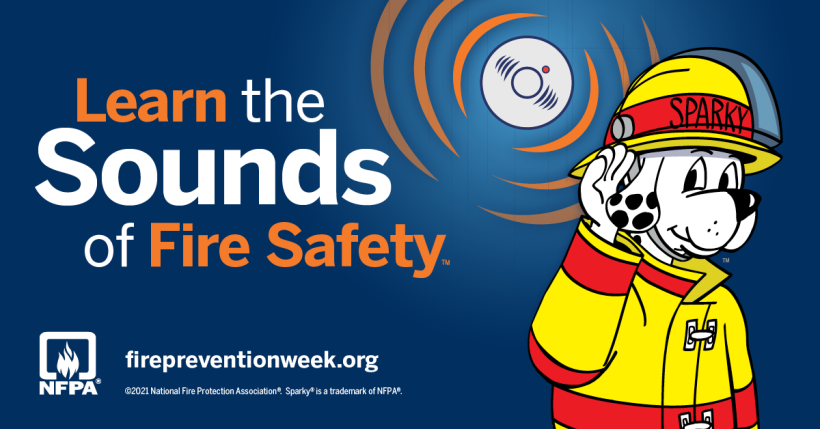
LAFOLLETTE, TN (SPECIAL TO WLAF) – National Fire Prevention Week is October 3-9, 2021. This year’s theme, “Learn the Sounds of Fire Safety,” will draw public attention to the different sounds that modern smoke and carbon monoxide (CO) alarms make – and what actions we should take when we hear them.
“Every home is required to have working smoke alarms and most are also required to have CO alarms,” said State Fire Marshal Peter J. Ostroskey. “When these alarms beep or chirp, it’s time to take action. Make sure everyone in your home recognizes these sounds, understands what they mean, and knows how to respond.”
Hear a beep? Get on your feet!
A continuous series of three or four loud beeps means smoke, fire, or carbon monoxide. Get out, stay out, and call 9-1-1.
Hear a chirp? Make a change!
A chirping alarm every 30 or 60 seconds means the alarm’s batteries – or the entire alarm – must be replaced. If an alarm using replaceable alkaline batteries doesn’t respond or continues chirping with fresh batteries, replace it right away.
“If your smoke or CO alarms take replaceable batteries, we recommend changing the batteries twice a year, usually at the beginning and end of Daylight Saving Time,” said State Fire Marshal Ostroskey. “Sealed alarms with non-replaceable, long-life batteries should be replaced after 10 years.”
For more than a decade, all smoke and carbon monoxide alarms have had the manufacturing date printed on the back. If the date on your smoke alarm is more than 10 years old, if the date on your CO alarm is more than five to seven years old, or if there’s no date at all, it’s time to replace the alarm.
Options for People Who are Deaf or Hard of Hearing
People who are deaf or hard of hearing may not be able to hear typical alarms to let them know there is danger – but specialized alarms and devices are available to ensure everyone’s safety in case of fire or high CO levels. These devices may have strobe lights to alert them when they’re awake, or a pillow or bed shaker activated by the sound of a standard alarm for when they’re asleep. As with any alarm, they can also signal when the battery is low.
Maintenance
Follow your alarm manufacturer’s cleaning instructions to keep them working properly: these instructions are included with the packaging and can be found online. Test alarms once a month and replace them if they fail to respond.
Working Smoke and CO Alarms Save Lives
“Working smoke alarms can cut the risk of dying in a fire in half, and working CO alarms can alert you to a deadly gas you can’t see, taste, or smell,” said State Fire Marshal Ostroskey. “The noises these alarms make can be the difference between life and death – so make sure you and your loved ones learn the sounds of safety.”
For more information on smoke and CO alarms, visit HERE. For more Fire Prevention Week tips, visit HERE.
About Fire Prevention Week
Since 1922, the National Fire Protection Association has sponsored the public observance of Fire Prevention Week. In 1925, President Calvin Coolidge proclaimed Fire Prevention Week a national observance, making it the longest-running public health observance in our country. During Fire Prevention Week, children, adults, and teachers learn how to stay safe in case of a fire. Firefighters provide lifesaving public education in an effort to drastically decrease casualties caused by fires. (WLAF NEWS PUBLISHED – 10/04/2021-6AM)

.jpg)